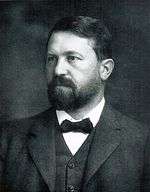Theodor Boveri
| Theodor Boveri | |
|---|---|
 | |
| Born |
12 October 1862 Bamberg, Bavaria |
| Died |
15 October 1915 (aged 53) Würzburg, Bavaria |
| Nationality | German |
| Known for |
Embryonic development Boveri-Sutton chromosome theory Centrosome |
| Scientific career | |
| Fields | Genetics, Cell biology |
| Influenced | Kristine Bonnevie |
Theodor Heinrich Boveri (12 October 1862 – 15 October 1915) was a German biologist. He was notable for first hypothesising the cellular processes that cause cancer, and for describing chromatin diminution in nematodes. Boveri was married to the American biologist Marcella O'Grady (1863–1950). Their daughter Margret Boveri (1900–1975) became one of the best-known post-war German journalists.[1]
Work
Boveri's work with sea urchins showed that it was necessary to have all chromosomes present in order for proper embryonic development to take place. This discovery was an important part of the Boveri–Sutton chromosome theory. His other significant discovery was the centrosome (1888), which he described as the especial organ of cell division. Boveri also discovered the phenomenon of chromatin diminution during embryonic development of the nematode Parascaris.
He also reasoned in 1902 that a cancerous tumor begins with a single cell in which the makeup of its chromosomes becomes scrambled, causing the cells to divide uncontrollably. He proposed carcinogenesis was the result of aberrant mitoses and uncontrolled growth caused by radiation, physical or chemical insults or by microscopic pathogens. It was only later that researchers such as Thomas Hunt Morgan in 1915 demonstrated that Boveri was correct.
Boveri described the structure of the kidneys in Amphioxus (Cephalochordata).[2]
References
- ↑ Baltzer, Fritz (1967). "Theodor Boveri: The Life of a Great Biologist 1862–1915". Archived from the original on 28 February 2005. Retrieved 22 July 2007. . Extract published in Gilbert, SF (2006). DevBio: a companion to Developmental Biology, 8th ed. Sinauer Associates.
- ↑ Holland, Nicholas D. (2017). "The long and winding path to understanding kidney structure in amphioxus - a review". Int. J. Dev. Biol. 61: 683–688. doi:10.1387/ijdb.170196nh.
- ↑ Scheer, U., 2018. Boveri's research at the Zoological Station Naples: Rediscovery of his original microscope slides at the University of Würzburg. Marine Genomics (2018) doi.org/10.1016/j.margen.2018.01.003
Sources
- Boveri, Theodor (2008). "Concerning The Origin of Malignant Tumours". Journal of Cell Science. 121 (Supplement 1): 1–84. doi:10.1242/jcs.025742. PMID 18089652.
- Maderspacher, Florian (2008). "Theodor Boveri and the natural experiment". Current Biology. 18 (7): R279–R286. doi:10.1016/j.cub.2008.02.061. PMID 18397731.
- Satzinger, Helga (March 2008). "Theodor and Marcella Boveri: chromosomes and cytoplasm in heredity and development". Nat. Rev. Genet. 9 (3): 231–8. doi:10.1038/nrg2311. PMID 18268510.
- Laubichler, Manfred D; Davidson Eric H (February 2008). "Boveri's long experiment: Sea urchin merogones and the establishment of the role of nuclear chromosomes in development". Dev. Biol. 314 (1): 1–11. doi:10.1016/j.ydbio.2007.11.024. PMC 2247478. PMID 18163986.
- Bignold, Leon P; Coghlan Brian L D, Jersmann Hubertus P A (July 2006). "Hansemann". Cell Biol. Int. 30 (7): 640–4. doi:10.1016/j.cellbi.2006.04.002. PMID 16753311.
- Hardy, Paul A; Zacharias Helmut (December 2005). "Reappraisal of the Hansemann-Boveri hypothesis on the origin of tumors". Cell Biol. Int. 29 (12): 983–92. doi:10.1016/j.cellbi.2005.10.001. PMID 16314117.
- Wunderlich, Volker (September 2002). "JMM—past and present. Chromosomes and cancer: Theodor Boveri's predictions 100 years later". J. Mol. Med. 80 (9): 545–8. doi:10.1007/s00109-002-0374-y. PMID 12226736.
- Manchester, K L (July 1997). "Overlooked Nobel laureates". Adler Museum bulletin. 23 (2): 20–1. PMID 11619485.
- Manchester, K (1997). "The quest by three giants of science for an understanding of cancer". Endeavour. 21 (2): 72–6. doi:10.1016/S0160-9327(97)01030-2. PMID 9237430.
- Moritz, K B; Sauer H W (February 1996). "Boveri's contributions to developmental biology—a challenge for today". Int. J. Dev. Biol. 40 (1): 27–47. PMID 8735909.
- Baltzer, F (May 1964). "Theodor Boveri". Science. 144 (3620): 809–15. doi:10.1126/science.144.3620.809. PMID 14149391.
- Stern, C (September 1950). "Boveri and the early days of genetics". Nature. 166 (4219): 446. doi:10.1038/166446a0. PMID 14775717.
Further reading
- Jane, Oppenheimer (1970–80). "Boveri, Theodor". Dictionary of Scientific Biography. 2. New York: Charles Scribner's Sons. pp. 361–365. ISBN 978-0-684-10114-9.
External links
- Markus Engstler and Ulrich Scheer. Theodor Boveri Resources and Virtual Library in Wuerzburg
- Fritz Baltzer. (1967). excerpt from Theodor Boveri: The life of a great biologist, 1862–1915. University of California Press, Berkeley; pp. 85–97.